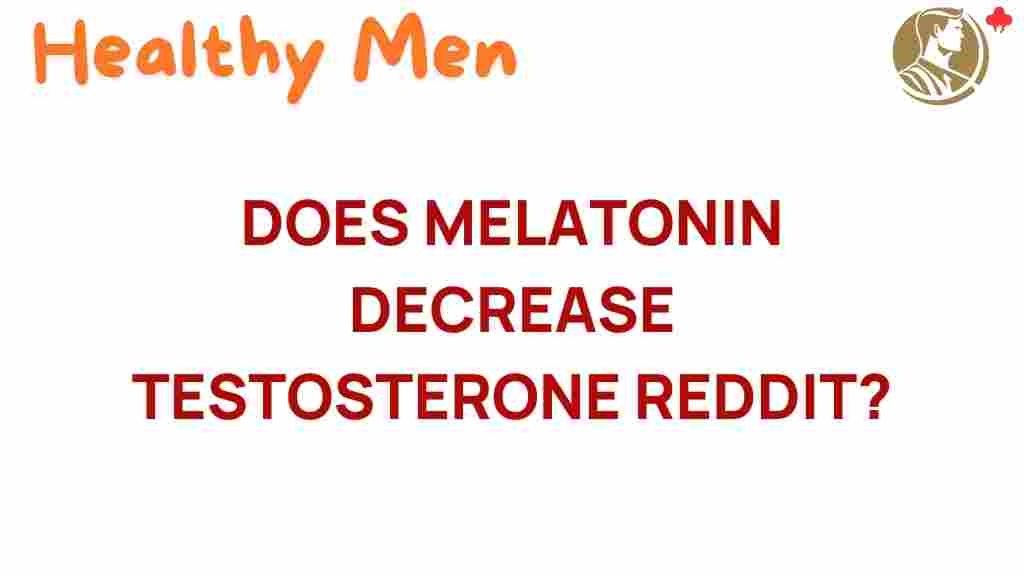Unraveling the Truth: Does Melatonin Decrease Testosterone?
In recent years, the popularity of melatonin supplements has surged, primarily due to their effectiveness in promoting better sleep. However, as more individuals turn to these supplements, a pressing question arises: does melatonin decrease testosterone levels? This article delves into the relationship between melatonin, testosterone, and overall health, exploring research findings, biological effects, and user experiences from platforms such as Reddit.
Understanding Melatonin and Testosterone
Before we can address the question of whether melatonin affects testosterone levels, it’s essential to understand what these hormones are and their roles in the body.
- Melatonin: A hormone primarily produced by the pineal gland in response to darkness. It regulates sleep-wake cycles, signaling to the body when it’s time to sleep.
- Testosterone: A vital hormone in both men and women, though more prominent in men. It plays a crucial role in muscle growth, fat distribution, bone density, and overall health.
The Importance of Sleep for Hormone Levels
Sleep is critical for maintaining balanced hormone levels. During sleep, the body engages in various recovery processes, including the release of hormones like testosterone. Poor sleep can lead to hormonal imbalances, affecting both melatonin and testosterone levels.
Research on Melatonin and Testosterone
Several studies have investigated the effects of melatonin on testosterone levels. The findings, however, present a mixed picture:
- Some studies suggest that melatonin may inhibit testosterone production, particularly in animal models.
- Other research indicates that melatonin does not significantly affect testosterone levels in humans, especially when taken in moderate doses.
- A few studies propose that melatonin might improve sleep quality, which indirectly supports healthy testosterone levels.
For example, a study published in the Journal of Pineal Research found that melatonin supplementation in men did not significantly impact testosterone levels but improved sleep quality. Conversely, an animal study indicated that excessive melatonin might reduce testosterone secretion.
User Experiences from Reddit
Platforms like Reddit provide a wealth of anecdotal evidence from users who have tried melatonin supplements. Many users report:
- Improved sleep quality and duration.
- Mixed feelings about testosterone levels, with some claiming a decrease in libido.
- Positive effects on overall health when combined with a balanced lifestyle.
While personal stories can offer insights, they are not substitutes for scientific research. It is crucial to consider the broader body of evidence when assessing the effects of melatonin on testosterone levels.
Biological Effects of Melatonin
To understand how melatonin might impact testosterone, we must consider its biological effects:
- Regulation of Circadian Rhythms: Melatonin plays a key role in regulating the body’s internal clock, which influences various hormonal rhythms, including testosterone release.
- Oxidative Stress Reduction: Melatonin has antioxidant properties, which can protect cells, including those in the testes responsible for testosterone production.
- Interaction with Other Hormones: Melatonin may interact with other hormones such as cortisol, which can influence testosterone levels.
The Step-by-Step Process: How to Use Melatonin Wisely
If you’re considering melatonin supplements to improve your sleep without negatively impacting testosterone levels, here’s a step-by-step guide:
1. Assess Your Sleep Needs
Before starting any supplement, evaluate your sleep patterns. Are you getting enough quality sleep? If not, melatonin might be beneficial.
2. Consult a Healthcare Professional
Discuss your intentions with a healthcare provider, especially if you have any pre-existing conditions or are taking other medications.
3. Start with a Low Dose
Begin with the smallest effective dose (typically 0.5 to 1 mg) to see how your body reacts. Gradually increase if necessary, but avoid excessive doses.
4. Monitor Your Sleep and Hormone Levels
Keep track of your sleep quality, duration, and any changes in your energy levels or libido. Consider consulting with a healthcare professional to monitor testosterone levels if you have concerns.
5. Combine with Healthy Sleep Hygiene
Melatonin works best when combined with good sleep practices:
- Create a sleep-friendly environment (dark, cool, and quiet).
- Establish a regular sleep schedule.
- Avoid screens and stimulants before bed.
Troubleshooting Tips for Melatonin Use
If you experience issues while taking melatonin, here are some troubleshooting tips:
- Insomnia Persists: If melatonin does not help, reconsider your sleep hygiene practices or explore other sleep aids.
- Hormonal Changes: If you notice changes in libido or energy levels, consult a healthcare provider for advice.
- Side Effects: Common side effects include dizziness and daytime drowsiness. If these occur, consider adjusting the dosage or discontinuing use.
Alternative Supplements
If melatonin does not suit you, consider other natural supplements that may support sleep without impacting testosterone negatively, such as:
- Magnesium: Known for its calming effects and ability to improve sleep quality.
- Valerian Root: Often used to help with insomnia and anxiety.
- Chamomile: A natural herb that promotes relaxation.
Conclusion: Finding the Balance
The relationship between melatonin and testosterone is complex and still under research. While some studies suggest potential decreases in testosterone levels with high doses of melatonin, the evidence remains inconclusive. Most individuals can benefit from melatonin for sleep without significant negative impacts on hormone levels, especially when used responsibly.
Ultimately, the key to maintaining healthy hormone levels lies in a balanced lifestyle that includes adequate sleep, nutrition, and exercise. If you’re considering melatonin supplements, approach with caution, and always prioritize your overall health.
For more insights on hormone health, check out Healthline for reliable information.
Remember, your body is unique, and what works for one person may not work for another. Listening to your body and consulting with healthcare professionals can help you find the right balance for your health.
This article is in the category Conditions and created by healthymen Team
